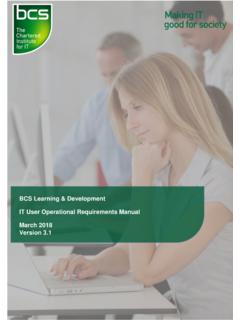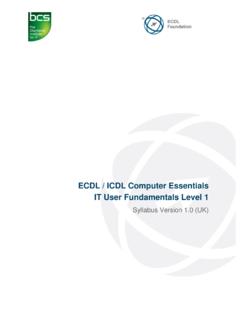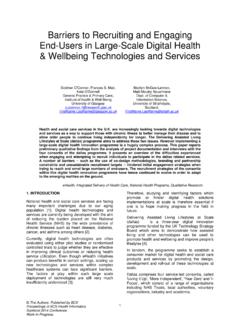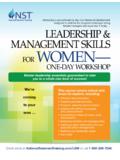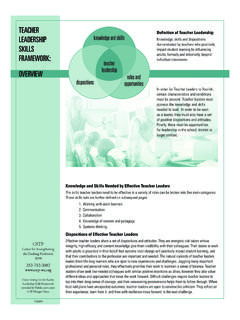Transcription of 9781780171029 Management Skills in IT - bcs.org
1 Management Skills IN ITShaping your careerMANAGEMENT Skills IN ITBCS THE CHARTERED INSTITUTE FOR ITOur mission as BCS, The Chartered Institute for IT, is to enable the information society. We promote wider social and economic progress through the advance-ment of information technology science and practice. We bring together industry, academics, practitioners and government to share knowledge, promote new think-ing, inform the design of new curricula, shape public policy and inform the vision is to be a world-class organisation for IT. Our 70,000 strong membership includes practitioners, businesses, academics and students in the UK and interna-tionally. We deliver a range of professional development tools for practitioners and employees. A leading IT qualification body, we offer a range of widely recognised InformationBCS The Chartered Institute for IT, First Floor, Block D, North Star House, North Star Avenue, Swindon, SN2 1FA, United Kingdom.
2 T +44 (0) 1793 417 424F +44 (0) 1793 417 Skills IN ITShaping your future 2011 British Informatics Society LimitedThe right of the author(s) to be identified as author of this work has been asserted by him/her in accordance with sections 77 and 78 of the Copyright, Designs and Patents Act rights reserved. Apart from any fair dealing for the purposes of research or private study, or criticism or review, as permitted by the Copyright Designs and Patents Act 1988, no part of this publication may be reproduced, stored or transmitted in any form or by any means, except with the prior permission in writing of the publisher, or in the case of reprographic reproduction, in accordance with the terms of the licences issued by the Copyright Licensing Agency.
3 Enquiries for permission to reproduce material outside those terms should be directed to the trade marks, registered names etc. acknowledged in this publication are the property of their respective owners. BCS and the BCS logo are the registered trade marks of the British Computer Society charity number 292786 (BCS).Published by British Informatics Society Limited (BISL), a wholly owned subsidiary of BCS The Chartered Institute for IT First Floor, Block D, North Star House, North Star Avenue, Swindon, SN2 1FA, PDF ISBN: 978-1-78017-102-9ePUB ISBN: 978-1-78017-103-6 Kindle ISBN: 978-1-78017-104-3 British Cataloguing in Publication CIP catalogue record for this book is available at the British :The views expressed in this book are of the author(s) and do not necessarily reflect the views of BCS or BISL except where explicitly stated as such.
4 Although every care has been taken by the authors and BISL in the preparation of the publication, no warranty is given by the authors or BISL as publisher as to the accuracy or completeness of the information contained within it and neither the authors nor BISL shall be responsible or liable for any loss or damage whatsoever arising by virtue of such information or any instructions or advice contained within this publication or by any of the by Lapiz Digital Services, Chennai, Preface viSECTION 1: Management AND PERSONAL Skills 11 DO WE NEED A SOFTER SIDE? Jooli Atkins 2 2 EQUIPPING IT LEADERS Simon Mitchell 43 NEW MANAGER TO GREAT MANAGER Jean Gamester 8 SECTION 2: CAREERS AND TRAINING 124 UNDERSTANDING BUSINESS Gary Flood 135 TRAINING A NEW GENERATION OF LEADERS Dave McKay 166 MOVING TO THE TOP BECOMING CIO Gary Flood 19 SECTION 3: leadership AND TECHNOLOGY 247 WILL YOU NEED A CIO BY 2020?
5 Amitabh Apte 258 WHAT THE CIO CAN LEARN FROM TEENAGEERS Rob Chapman 289 LEADING VIRTUAL TEAMS Gary Flood 31 SECTION 4: CIO A CHANGING ROLE 3510 THE STATE OF CIO EVOLUTION OF THE CIO MANDATE AND ROLE Amitabh Apte 36 USEFUL RESOURCES 38vPREFACETo be a great IT manager is to understand that IT success is based upon a blend of Skills that mixes IT craft, ability and knowledge with a true understanding of what the organisation is trying to achieve and the context within which it sits. Great IT leaders can get themselves, their teams and their organisations in front of the IT curve, realising opportunities. To be behind the curve is to see only and Skills that made IT people successful in the past cannot be relied upon to guarantee similar levels of success in the future.
6 It is true that technical ability and knowledge represent a sound bedrock for an IT leader, however this is not enough in a modern world where information and technology can revolutionise business models, social norms, perceived wisdom and even nation to this environment is a growing population of digital natives, demanding ever higher levels of integration and intuitive function. But this is the moment for IT managers to make their mark, to take ownership of information, innovation and competitive advantage even the Financial Times said that those who are able to exploit IT for the benefit of the business are going to be the new rock stars of pay and To take their seat at board level, IT professionals must address the reality and, in some cases, the hangover of perception regarding their soft Skills , which must be at least equal to those demonstrated by professional leaders across all sectors and organisations.
7 The articles and blog posts in this collection explore these issues and suggest ways to become a truly great IT can be inspiring and requires equally inspiring leaders for this vision to come to ThilthorpeDirector for ProfessionalismBCS, The Chartered Institute for ITviSECTION 1: Management AND PERSONAL SKILLS11 DO WE NEED A SOFTER SIDE? Jooli Atkins, August 2011I was interested to read that, according to recent CW Jobs research, the lack of soft Skills is the latest IT career regression factor. My experience, however, is that many IT professionals believe that they don t need soft Skills and that technical Skills are the only ones needed for an IT many years, I have designed, developed and delivered workshops to help IT professionals develop their communication, customer service and training Skills .
8 So often the IT managers recognise the need for such Skills in their staff, but when the staff themselves are sent on a course, they are often resistant and have no understanding of why such Skills are important in their role. Of course that could be because the managers are sending their staff and don t have the relevant skill to prepare them sufficiently in the first place, but it is also apparent that technical Skills are often seen as more such experience was with a group of IT helpdesk staff for a local authority whose role was to support teachers in schools. They were attending a Customer Service for IT Professionals workshop and, as part of this, were asked to represent their customers in some way. Most groups chose to draw a representation, which had disturbing similarities.
9 Customers were represented as stupid, illiterate (in IT terms) and incapable of understanding simple (in the helpdesk staff s terms) instruction and these are qualified teachers, helpdesk staff s perception of their customers was compounded by the fact that they saw no benefit in gaining any insight into their customers perspective because if they don t get it .. it s not our fault! You may be pleased to know that a few customer/supplier barriers were broken down that day, but not before a lot of soul-searching from that with another experience with an internet giant (beginning with Y), whose specialists are worldwide experts in some of the narrowest of technical fields and so are often asked to train others in their subject-matter expertise. We were asked to help them to deliver more effective learning.
10 At the end of the workshop, one of the cleverest men I have ever met admitted that he had been doing it wrong all this time . He absolutely got how enhancing his soft Skills could help him to be an even better technician. To a man (because, sadly, they were all men) that team benefited from their learning and could see how improving on their soft Skills would help them to help others. Maybe it was the organisation that made the difference they were very open-minded and not threatened by the softer demands on them. They had the technical Skills , but they also understood that that is not all that s needed to make us good at our how can we get IT professionals to accept that they need help? Perhaps this CW Jobs research will help, but I doubt that the people who need it will even look at the Computer Weekly article because it is categorised under IT Management , Staffing and the authorJooli Atkins FBCS CITP FIITT has been involved in the IT profession for the past 25 years, mainly in IT training.



